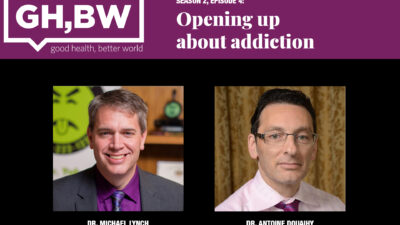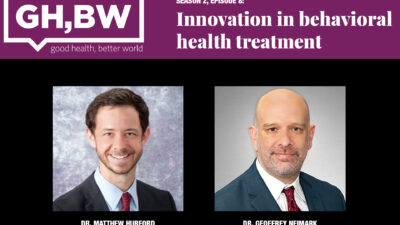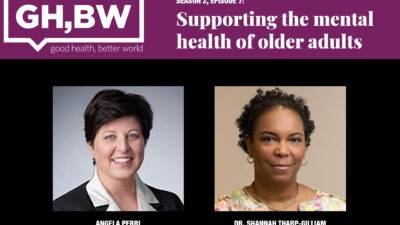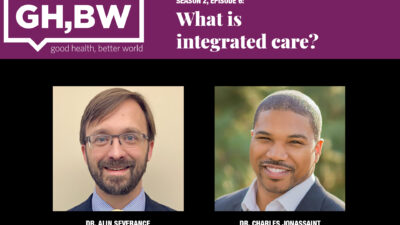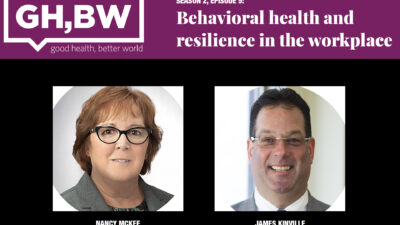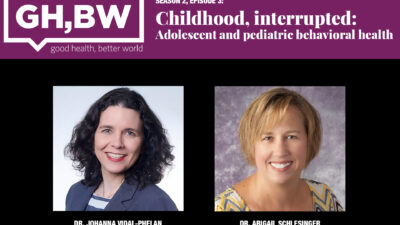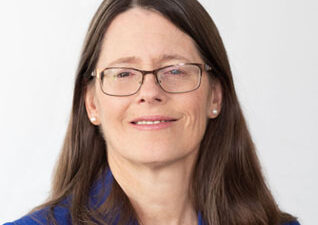In this episode:
In this episode, we hear from behavioral health experts who discuss different types of addictions, the impact, and how to get support on a path to recovery. Hear insights from Dr. Michael Lynch, associate professor of Emergency Medicine, Toxicology, Pediatrics, and Addiction Medicine at the University of Pittsburgh, and Dr. Antoine Douaihy, who specializes in psychiatry and practices at University of Pittsburgh Physicians, Department of Psychiatry.
Have questions? Email us at [email protected]
Resources:
Are you experiencing a crisis or are concerned about a loved one?
Residents of Allegheny County can call resolve Crisis Network which provides crisis counseling for a variety of issues, at 1-888-796-8226, or click here.
For help with addiction, call the Substance Abuse and Mental Health Service Administration's hotline at 1-800-662-4357, or click here.
For general resources on addiction and mental illness, visit the Substance Abuse and Mental Health Services Administration, here.
For help with a mental health crisis, reach National Alliance on Mental Illness by dialing 988, or click here.
To reach UPMC Western Psychiatric Hospital and UPMC Western Behavioral Health, call 1-877-624-4100, or click here.
UPMC Health Plan members can learn more about behavioral health programs, tools, and resources, by clicking here.
To learn more about Community Care Behavioral Health, click here.
More:
For information from The Mayo Clinic on strategies to help a loved one suffering from addiction, click here.
CNN reports that about 2.5 million middle and high school students use e-cigarettes.
Nine out of 10 adults in the United States say there's a mental health crisis in the country, according to a survey by CNN and The Kaiser Family Foundation.
Visit the Good Health, Better World podcast page, here, and read the transcript, below:
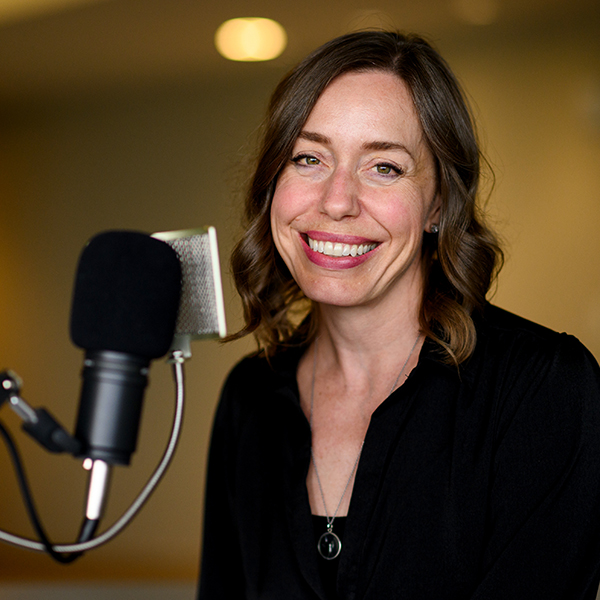
Dr. Ellen Beckjord: On this episode of Good Health, Better World, we're going to talk about different areas of addiction as a core component of behavioral health. In this episode, we'll talk with Dr. Michael Lynch, medical director for Substance Use Disorder Services at UPMC Health Plan, director of the UPMC Medical Toxicology Telemedicine Bridge Clinic, and associate professor at the University of Pittsburgh School of Medicine. We're also joined by Dr. Antoine Douaihy, director of the Addiction Psychiatry Fellowship at Western Psychiatric Hospital, co-director of the Tobacco Treatment Service at the University of Pittsburgh Medical Center, and professor of Psychiatry and Medicine at the University of Pittsburgh School of Medicine.
Dr. Lynch, welcome to Good Health, Better World.
Dr. Michael Lynch: Thank you for having me. Happy to be here.
Dr. Ellen Beckjord: Dr. Douaihy, thank you so much for joining us on Good Health, Better World.
Dr. Antoine Douaihy: Thank you so much for inviting me.
Dr. Ellen Beckjord: Addiction is a broad area of medicine, and many people may only think of certain drugs and alcohol as being in the realm of addiction. But could you please define for us, in your own words, what addiction is and some of the areas of addiction that are the focus of your clinical practice and research, or ones that you think are especially important for our listeners to be thinking about today.
Dr. Antoine Douaihy: This is really a terminology issue here, because, obviously, you hear about addiction everywhere and it might be, at times, perceived as stigmatizing. The definition of addiction revolves around the whole — encompassing, in a way, all substance use disorders and other addictive disorders. And when we're referring to, really, the substance use disorders, and addiction, addiction usually is the most severe spectrum of the substance use disorders, because across the substance use disorders, we have mild, moderate, as well as severe forms. So, for example, substance use disorders, I'm referring to alcohol use disorders, cocaine use disorders, methamphetamine use disorders, opioid use disorder, all these different types of drug-related disorders. There are also non-drug-related addictions, such as, the most typical one is the gambling disorder. Terminology can be very stigmatizing, and when we label people using words like “addict,” “abuser,” — it can be very damaging. So, we want to really use very non-stigmatizing, non-labeling language. And when we discuss addictions, we talk about behaviors, we don't talk about labeling people.
Dr. Ellen Beckjord: One thing I'm hoping that we can talk about today is vulnerability to addiction. And, so, I want to come back to that. But I really like the fine point that you're putting on the importance of not enforcing stigma around addiction and being careful about the language that we use when we talk about addiction to make sure that we don't do that. And part of what I hear you saying is that some of how we can do that, is rather than label people, talk about behaviors. So, is it fair to characterize addictive behaviors as ones that really interrupt people's level of function or quality of life — to live their life in alignment with their stated needs, preferences, and values?
Dr. Antoine Douaihy: Yes, very much. You know, you said it very eloquently about addictive behaviors, because when we talk about addictive behaviors, it's a whole range, in a sense, how we define people who have substance use problems. And, as you mentioned, also what ends up happening with people who end up engaging in addictive behaviors, the addictive behaviors could become extremely severe — to a point where they can affect their functioning, their ability to establish relationships, their ability to maintain jobs, and quality of life, in general. And, most of the time — and which is really exactly what we focus on in treatment — is that a lot of the addictive behaviors for most patients would be not aligned with their value system.
The focus here is on how we can identify very early on these addictive behaviors, so we can really do whatever we can to prevent it from evolving into a full-blown addiction. So, we would want to really kind of work with patients very early on to help identify these addictive behaviors and/or any sort of a substance use disorder, let's say, on the mild-moderate spectrum, and really immediately aggressively treat and engage them in treatment.
Dr. Ellen Beckjord: Dr. Lynch, I'm struck by, through our conversation that there are really multiple factors, like we're having an episode where we're talking about addiction, but addiction is a very multifaceted, sort of multidimensional construct. And is there usually a severity indicator that accompanies potentially a diagnosis associated with addiction?
Dr. Michael Lynch: There are definitions that are based loosely well, not even loosely, directly on the number of criteria met. So, there is a list of 11 criteria. And the more of those that you meet, the more severe, so mild, moderate to severe. And there's a separate category of, you know, misuse or risky use, if you will, where, you know, somebody who uses heroin. Well, that's really never recommended. There's always a lot of risk for it.
But, you know, they do it here and there. And it's not something that rules their life. That's not technically an addiction. It's dangerous. It's something that we would want to intervene and talk to the person about to understand the dangers and alternatives and things like that. So, there's a behavioral change that would be recommended or sought, but it wouldn't really qualify as a use disorder or addiction. So, it, and when you go, so it doesn't matter which of the criteria you meet to determine whether something is mild, moderate to severe, it's really a number, you meet three or five or six or eight and that sort of determines the severity and then that is associated with codes as well.
But to getting back to your question, as far as severity, there are levels based on the number of actions or behaviors or physical consequences that somebody experiences as a result of behavior or substance.
Dr. Ellen Beckjord: Are there times in life over sort of developmental stages or just different parts of the lifespan that are associated with a higher likelihood of that being a time in life when addictive behaviors or addictive disorders can develop?
Dr. Michael Lynch: It is primarily a disease that's identified or most commonly seen in young adults, essentially older adolescents and young adults. Which is not to say that it can't happen at any stage, but as you know, a combination of access, life experience, social surroundings, coping, lack of coping skills and things like that, older adolescents really start to become at risk. And then younger adults, as they grow older now, you know, then once, you know, an addiction is not an isolated thing. It's something that is a lifelong, you know, disease. And so, you know, once present and identified, it's something that somebody is going to have as a part of them to varying degrees.
Dr. Ellen Beckjord: Let's talk a little bit about stigma and addiction.
Can you talk a little bit about how stigma creates barriers in the context of seeking help for or receiving help for an addiction? Whether you think that's changing positively or negatively and what you think from an education perspective is important for people and even the provider community to know if we are seeking to reduce the stigma associated with addiction.
Dr. Michael Lynch: At the foundation, I think, you know, stigma is related to an attribution of blame in many cases. And for something that is a mental health or behavioral health disorder, including addiction, even with physical complications, it becomes much more difficult to wrap your head around, I think, if you're not somebody who's suffering from it because you can't see it. There isn't a lab test, there isn't a broken bone or a cast or a scar, visible scar that you can kind of connect it to.
And so, it and it's so painful that it becomes sort of an almost easier to just kind of blame the person as opposed to trying to take a step back and understanding it as this complex interplay of neurochemical factors that lead to a disease that's behavioral but leads to physical manifestations that affect all of us.
So, I think that the foundation of stigma is important in behavioral health and specifically for addiction, where I think it's seen as choices that people make, which is true in a way, but it discounts all the factors that lead to that choice.
But stigma, you know, associated with accessing treatment, which at this point, identification and prevention and then treatment are really the only ways that we can achieve those goals.
And, so, the early identification becomes important, and that's a matter of doing. I think there's less stigma involved with screening early because something hasn't developed yet. But by the time somebody is using a substance, for instance, or demonstrating an addiction, there are very real barriers that at their foundation are related to stigma. From the individual's perspective, they know, they're aware that that's how things are viewed.
And so, of course, any of us can understand, well, if I'm going to go somewhere and be made to feel bad or be judged or have people look at me negatively, I don't want to do that. On the flip side, from a health care perspective, many providers continue to have some degree of that stigma. I do think it's improving.
Dr. Ellen Beckjord: I hear you saying how important early intervention is. And while there are any number of barriers to early intervention that we can discuss, it seems like that would be a big one if people are reluctant to disclose that they are feeling like an addictive behavior is becoming more severe or growing out of control for them. But again, because of stigma, they are afraid to approach or point that out to the individual, it makes the process of early intervention really impossible.
Dr. Antoine Douaihy: Exactly. You know what? Since we're referring now to the stigma, when I specifically mentioned the social stigma, the social stigma that leads to discrimination — we have, in fact, a lot of studies that have looked in the context of people who have addictive disorders. Social stigma can be very highly associated with pessimism, particularly among practitioners — and the sense of pessimism about the ability for people to change — when you are really already assuming that people are not going to be capable of changing their addictive behaviors, which kind of really is related to the stigma itself, that kind of, in a way, limits your ability to get them into treatment, and particularly if they are already self-stigmatizing.
Addictive disorders are highly treatable. It goes back to the importance of educating and really working with practitioners. How can we brainstorm, since this is not that sort of a treatment is not working, how can we work with them on different ways to approach it? You don't do this with patients who have, really, other medical illnesses. You always really try to really come up with some different approaches, different medications.
Dr. Ellen Beckjord: I'd like to ask you about individual-level differences in vulnerability to addiction, and then I'd like to talk a little bit about whether, at a population level, we're seeing changes in vulnerability to addiction. What are some of the things we know, at an individual level, that make some people more vulnerable to developing addictive behaviors versus others?
Dr. Antoine Douaihy: This has obviously been an ongoing question and dilemma that we've been really struggling with for years and years, trying to really figure it out. What makes more people more vulnerable than others?
At the same time, there are definitely, as you said, individual characteristics — that is correct. And at the same time, anybody is, in a way, vulnerable to an addictive behavior and, eventually, a full-blown addiction.
So, first of all, when you think about the etiology of trying to put it together, maybe there is an answer yes to everything.
First of all, the poor choices, you know, that people sometimes make at the beginning — experimenting. It starts with experimenting, without realizing that they might have the vulnerability they could. Some people do not even attempt to experiment, because if they have a family history of addiction, they say, well, look, I'm not going to touch any alcohol. You know, and there always is, the challenge is that we have a tendency to put the blame on the drugs themselves, that if there is access to drugs and if they are everywhere, people are going to try them. So, when people are going to try these drugs, how can we predict who could become potentially addicted? And we've had situations with people who used, let's say, an opioid, and they felt that something really happened in their brain.
Their brain kind of gets rewired so quickly, and they start treating, misusing more and more, taking more and more pills, you know, and now being addicted. There is, as I mentioned, also, the poor choices, the personal responsibility part, and personal responsibility seen also in other chronic medical illnesses. There is the environment. How can we understand all these things that are in the environment? So, you think about the agent, the host, and the environment.
If you want to think about it from a public health perspective, which this is how we want to think about it. And, so, you have these interactions between the agent, the host, the individual characteristics, maybe the genes. And now we're studying more and more, and trying to understand what makes more people vulnerable based on their genetic predisposition, at the same time, also the environment you're talking about, also about some of the psychosocial aspects.
So, it is really a very complex issue to limit it to one, one area, or, it could be more of a combination of all these factors that become very intertwined.
But one thing we would want to really clarify here — that any person at any particular point in time could be potentially vulnerable. If we can predict who this person would be really vulnerable, even knowing a lot of what we've been discussing about all these factors that are intertwined, there might not be all these factors together. They might be just a few here and there, or even none.
Dr. Ellen Beckjord: As you're talking, I can't help but think about how problematic it is, that vulnerability that accompanies having any behavioral health challenge and certainly struggling with addiction. There's so much vulnerability there. And the way that it interacts with that stigma to such disastrous effects.
And then thinking also about populations who are traditionally underserved or already marginalized or already really vulnerable because of things like systemic racism. Adding this vulnerability on top of that makes the stigma that can be a barrier to evidence-based treatment even worse and a contributor to health inequities in all realms of health care.
Dr. Michael Lynch: Absolutely. I mean, inequity in, well, in many things, but within health care is almost always, if not always, I hate to say always or never, found when you look for it. And it's very prevalent, in particular in addiction, where those who provide the care or provide the resources and support are not distributed evenly, right, across our population. A lot of it has to do with race, certainly socioeconomics. But it could be rurality versus urbanicity. Right. It's not only it's not just one thing, more needs to be focused in those populations that aren't benefiting from it and figure out why that is and try to overcome those reasons so that, you know, the inequity demands disproportionate interventions depending on the group to get people to a much more equitable place.
Dr. Ellen Beckjord: I'm wondering, Dr. Douaihy, if you could talk about some of the environmental factors that are associated with vulnerability to addictive behavior, and whether you think, at a population level, those environmental circumstances have become more prevalent — and, I'm thinking about things like social isolation, acute or chronic stress — and a lot of that we talk about in the context of the COVID-19 pandemic. But I think it predates that.
Dr. Antoine Douaihy: Excellent points again.
These are totally realistic challenges that we're dealing with. What you're referring to is also the socio-cultural context, and when you think about the environment, obviously, it kind of encompasses a lot of areas.
And what we're referring to also, the access to the drugs, obviously, or access to any particular behaviors, or easy access to particular situations where people can engage in particular behaviors.
You know, and also what you referred to is the vulnerabilities, in terms of population, who is targeted, the environment. When you think about addiction — the bigger picture of addiction — addiction is the number one really chronic medical illness that really, in a way, is so intertwined with everything on a social level, environmental level, cultural level, religious level. So, really, it's the typical illness that interfaces with everything — economic problems, you know, the poverty, the homelessness — so you talk about, really, when we talk about that environment that you're referring to, environmental context or factors you're talking about also, how it's been really modified, that environment, to a point where it really puts vulnerable populations, you know, at risk.
Dr. Ellen Beckjord: Yes.
Dr. Antoine Douaihy: When you really kind of in an area where you really you're not providing that economic support — and we talked about also, for example, what happened with COVID-19 — but as you said, these predated, I mean, they're, they got much worse. They are really more, we're seeing them more clearly now. Our eyes are more open.
What were we doing before that we were not really seeing all the impact of these environmental issues? But again, that kind of really brings up the issue of when we are really treating addiction — obviously there is the practitioner level, but there is a system level, there is really a patient level, there is a societal level.
So, there are so many different levels when it comes to really treating addiction. And that's why I mentioned the public health perspective, that it is not going to be just enough to really, kind of, treat the patients, you know, and really make sure, you know, they are receiving evidence based — but you want to influence all these environmental issues that affect them.
It doesn't require much — that something happens around you, that you lose the ability to stay on track. That really, kind of like a switch, that can really potentially happen. And one point I want to mention, if I may, you know, also remember we talked about the terminology and I want to really, you know, how much it is really important. And crucially, we would want to be very careful when we are referring to people relapsing — the word “relapsing” — think about it, people who have been dealing with cancer, you know, they've been doing very well. And we always say they have a recurrence, you know, we don't say they relapsed.
So, just to keep in mind, I think we want to try to move away — which is, I know we mentioned, we talked about the whole social stigma aspect — move away into really, kind of, thinking about it as, you know, more that people went back to the same behaviors, or started using again, or engage in another use. I mean, this kind of help really reframes what we've discussed earlier about addictive behavior.
Dr. Ellen Beckjord: I think a subtle, but very important, terminology distinction to make — and you're absolutely right — we would never talk about someone relapsing if they had a cancer recurrence.
Dr. Lynch, if someone is interested for themselves or someone else in learning about how to approach treatment, recovery — what are some of the resources that are available? And, if I could ask, one theme that comes up in a lot of these conversations about resources for mental and behavioral health, are the real and significant challenges with respect to the availability of those resources, being able to access those resources — and, so, I'd love to hear your thoughts about the degree to which we need more capacity in the context of intervention and treatments for addiction.
Dr. Michael Lynch: There are a lot of resources, but as usual, it really will depend on the individual — what would work best for them? Sort of the simplest thing can be starting with a phone call. There is a national 800 number that people can call to start that process, and it's through the Substance Abuse and Mental Health Services Administration, or SAMHSA, but it works with local jurisdictions. And so, you know, that's 1-800-662-HELP, and that is pretty much nationwide. So that's one option.
A lot of it, unfortunately, then after that, it becomes complicated pretty quickly — and that's, you know, so when there's already a lot of barriers to starting the process of even looking for it, the fact that there are barriers on the other side, you know, makes it doubly difficult compared to other disease processes where you say, Hey, I have diabetes or COPD, here's the specialist that takes care of that. I call them up. I make an appointment, I go. You know, for substance use disorders, it's not so obvious, it's not so clear. There are a lot of levels, and factors, and assessments, and paperwork, and, you know, insurance coverage, and hoops that need to be jumped through in order to get there.
And, so, you can imagine every step along the way where there's another hoop or barrier, some people just don't continue on. And, so, it will vary depending on where you are a lot, you know, in Pennsylvania, for instance, in our state, counties really run that, and every county has a drug and alcohol commission who's tasked with helping that individual walk through those steps. You know, in other places, it might be a primary care doctor. Going to an emergency department or crisis center can be okay, but depending on how it's set up, the outcome could be variable depending on where you are.
You know, if you're somebody who has insurance of some kind, going to your insurer and calling those numbers and starting the process that way is another way to start to identify providers who are within your network, and things like that.
Dr. Ellen Beckjord: Seeking help for addiction is a really vulnerable time — and so it's a shame that that that window, which, as you mentioned, is not one that often stays open for very long, is difficult to, you know, intervene with much swiftness or impact, because it's a, it's a pretty complicated set of services and screenings, and the like, that people typically have to go through. At the same time, it is true that we have evidence-based treatments for addiction and that people do achieve recovery and can live in recovery and without recurrence of addictive behaviors if they have the right support and treatment in place. Is it fair to say that it is?
Dr. Michael Lynch: It absolutely is. And, to your point about vulnerability — absolutely. You know, I know, I hate stopping for directions, right? I can imagine stopping and, you know, exposing myself to somebody to say, I'm doing this thing that is dangerous and I can't stop, and what that says about me. And that's why, you know, the cliched term of quote-unquote “rock bottom” is, unfortunately, often one that has to be met, but that vulnerability, I think, is absolutely critical and also needs to be understood on the other side, and that goes beyond just a health care provider. But again, from society, if you can get past our stigma and recognize that, and say, listen, here's this person, now we know that I can judge them and that will be easy, or I can say what you just did was really, really hard, and I recognize that. Now let's see what we can do to help you. So, recovery, when we talk about treatment for chronic diseases and, in the end, that's what we're talking about with addiction.
Addiction is a chronic relapsing-remitting disease, and we deal with many chronic relapsing-remitting diseases, whether it be COPD, high blood pressure, asthma, diabetes. You know, these are things that can be treated and controlled, and people can live very happy lives, but there's always a risk that it could become uncontrolled and require immediate care. But that isn't to say that once we get control of it again, that you can't then go back and live your happy, fulfilled life. Quite frankly, few diseases are ever cured — you know, they can be in remission, they can be controlled, they can be managed, but are often not cured.
I think that part is often missed and forgotten. And I also think, and understandably for people who are living in that kind of recovery, it can be difficult to kind of continue to put yourself out there and define yourself by that recovery.
Dr. Ellen Beckjord: I would love to hear your thoughts, Dr. Antoine Douaihy, on the things that you are feeling most hopeful or excited about when it comes to addiction medicine, or just how we are approaching and helping people recover from addictive behaviors and addiction disorders.
Dr. Antoine Douaihy: Well, thanks for asking this question. First, I want to reiterate what I said earlier — most people do recover, most people do get better, have better lives. They get back into employment, being productive members of society, and, you know, regain connections with family members. So just to leave that kind of a note of optimism here, from my own experience, seeing it for the past 25 years, working in the addiction field. What I believe we've made significant advances in, in terms of really early identification, you know, of addictive behaviors, substance use and all this, and early interventions and treatment — we talked about evidence-based treatments and practices. Unfortunately, we have systems that have not been implementing the evidence-based treatment — they've been doing whatever they could do. There is no way to monitor what has been provided for patients and their family members and their significant others, which is really very crucial. And so, unfortunately, when I see a lot of the systems that are so disintegrated, particularly in situations where we see most of the patients who have substance use disorder have also co-occurring psychiatric disorders.
But one thing that I can say in the past 40, 50 years, we've made significant changes. But the kind of work that needs to be done is on a system level, too. And we talk about policies, we talk about real policies — how we can really get people more into treatment, how we can retain people in the treatment, how we can really kind of provide adequate treatment, provide evidence-based treatment. How can we monitor what people are doing in treatment programs to make sure there is fidelity to the interventions? Are you providing them with a menu of options that would be helpful for them?
Dr. Ellen Beckjord: In your role at UPMC, Dr. Douaihy, do you play a significant role in training residents or fellows, or both, in psychiatry and psychology? Part of your role is training new providers in addiction medicine. Are you seeing that new cohort or generation of providers? Are you feeling encouraged by them? They're bringing, sort of, energy and hopefulness to this.
Dr. Antoine Douaihy: Yes, very much. You know, and I'll go back even to medical students — I work very closely with medical students, which I, you know, been training medical students in, you know, and the addiction, obviously, field, and specialty, but also particularly when it comes to the opioid epidemic, we've been providing through training grants, specific training, you know, for medical students. It has to start very early on in training to change perceptions, to change attitudes towards how you understand and listen better to people who struggle with addictions, because a lot of, really, trainees from early on are really very much misinformed, or they don't know much about what could work. Are there really treatments that work? Or again, this kind of remember I talked about the self-fulfilling prophecy that kind of can feed into it.
To me, what defines me and my identity as an addiction psychiatrist is really the mission of advocacy and activism. And in order for policy changes to really happen, you need to be out in the communities and you need to be out, at some level, to really advocate, which is really kind of a huge part of the work that I do.
So again, I always encourage, you know, trainees and practitioners to really kind of be more involved, you know, and really kind of, more engage in their communities and, to be able to really understand better, you know, what kind of changes they can help with, any sort of changes and any change they can anything they can contribute to, you know, could make a huge difference in our communities.
Dr. Ellen Beckjord: Do you think that that level of engagement at the advocacy level is also beneficial with respect to the degree to which it can really engender empathy?
Dr. Antoine Douaihy: Yes. I think that's crucial to really help change mindsets and heartsets.
Dr. Ellen Beckjord: Yes, I like that.
And, as we talk about this, it troubles me that, you know, addictive behaviors and addiction disorders are so prevalent that most people know someone, or have cared about someone, or who have loved someone who has either been challenged by, or lived with and struggled with addiction, or have even lost someone to an addiction disorder. I've lost a loved one to an addiction disorder. It's so prevalent that it's not uncommon, yet this stigma persists. But you would think that the prevalence of it alone would facilitate that empathic response, but there's just so much fear, it seems, around it, that it still is hard to, in some cases, get there, and this this judgment and prejudice and lack of empathy. Boy, that seems like something we ought to be able to overcome and make progress on as we seek to just kind of be more humane and loving in our approach.
Dr. Antoine Douaihy: Yeah. And one person at a time.
Dr. Ellen Beckjord: Yes.
Dr. Antoine Douaihy: I would say the training practitioners trained in empathic skills and humanistic, the humanistic approach and how to learn to integrate it with the evidence-based treatment and then all the rest of it will really come into place.
Dr. Ellen Beckjord: I love that answer. I think that connection is so important. I think that there are lots of ways that modern American life challenges the time that we have available to authentically connect with one another and to foster those connections. And, so, with the right intention and attention paid to it, that seems like such an accessible way to really drive some meaningful change. I'm so glad that you raised it here.
Dr. Antoine Douaihy: Thank you.
Dr. Ellen Beckjord: So, Dr. Lynch, my last question for you is about what one thing you think would be most important to do as we seek to really make progress in improving the public health landscape as it relates to addiction?
Dr. Michael Lynch: I mean, the most important thing would be addressing stigma, but that's a very nebulous kind of thing to do and addressing the way people think is not easily done. But from a systemic standpoint, what I would like to see as specifically from a health care perspective is that the treatment and the recognition of it is integrated to a much greater degree into medicine overall, as opposed to living in a silo. And this is true for behavioral health across the board. And I think we are recognizing and trying to get there. But there are a lot of factors, both well-intended and maybe historically stigma related, that can get in the way of that.
Dr. Ellen Beckjord: And I think you're right. The data are certainly on your side, and I think we have seen some increases in that with respect to screening for substance use disorders in primary care. But there's certainly a lot and screening for, say, depression in primary care, but certainly more that we can do and more good work to be done on that integration front.
Dr. Ellen Beckjord: So, I want to thank you so much for being with us on Good Health, Better World. This was a wonderful discussion about an important topic, and really appreciate you taking the time to share your expertise and your thoughts with us.
Dr. Antoine Douaihy: Thank you so much for having me.
Dr. Michael Lynch: Thank you very much.

